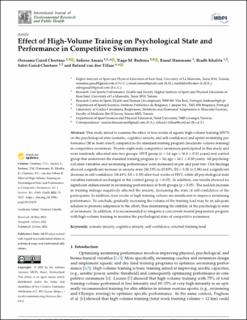| dc.contributor.author | Chortane, Oussama Gaied | |
| dc.contributor.author | Amara, Sofiene | |
| dc.contributor.author | Barbosa, Tiago M. | |
| dc.contributor.author | Hammami, Raouf | |
| dc.contributor.author | Khalifa, Riadh | |
| dc.contributor.author | Chortane, Sabri Gaied | |
| dc.contributor.author | van den Tillaar, Roland Johannes Wilhelmus | |
| dc.date.accessioned | 2023-02-07T12:29:42Z | |
| dc.date.available | 2023-02-07T12:29:42Z | |
| dc.date.created | 2022-09-19T11:32:31Z | |
| dc.date.issued | 2022 | |
| dc.identifier.citation | Chortane, O. G., Amara, S., Barbosa, T. M., Hammami, R., Khalifa, R., Chortane, S. G. & van den Tillaar, R. (2022). Effect of high-volume training on psychological state and performance in competitive swimmers. International Journal of Environmental Research and Public Health, 19(13), Article 7619. doi: | en_US |
| dc.identifier.issn | 1660-4601 | |
| dc.identifier.uri | https://hdl.handle.net/11250/3048886 | |
| dc.description.abstract | This study aimed to examine the effect of four weeks of aquatic high-volume training (HVT) on the psychological state (somatic, cognitive anxiety, and self-confidence) and sprint swimming performance (50 m front crawl) compared to the standard training program (moderate volume training) in competitive swimmers. Twenty-eight male competitive swimmers participated in this study and were randomly allocated into two groups: HVT group (n = 14; age = 16.4 ± 0.31 years) and control group that underwent the standard training program (n = 14; age = 16.1 ± 0.30 years). All psychological state variables and swimming performance were measured in pre and post-test. Our findings showed a significant increase in anxiety state (34.13% to 45.83%; ES = 3.26 to 3.38) and a significant decrease in self-confidence (18.43%; ES = 2.39) after four weeks of HVT, while all psychological state variables remained unchanged in the control group (p > 0.05). In addition, our results showed no significant enhancement in swimming performance in both groups (p > 0.05). The sudden increase in training mileage negatively affected the anxiety, decreasing the state of self-confidence of the participants. In addition, four weeks of high training volume are insufficient to improve swimming performance. To conclude, gradually increasing the volume of the training load may be an adequate solution to promote adaptation to the effort, thus maintaining the stability of the psychological state of swimmers. In addition, it is recommended to integrate a concurrent mental preparation program with high-volume training to monitor the psychological state of competitive swimmers. | en_US |
| dc.language.iso | eng | en_US |
| dc.publisher | MDPI | en_US |
| dc.rights | Navngivelse 4.0 Internasjonal | * |
| dc.rights.uri | http://creativecommons.org/licenses/by/4.0/deed.no | * |
| dc.title | Effect of high-volume training on psychological state and performance in competitive swimmers | en_US |
| dc.type | Peer reviewed | en_US |
| dc.type | Journal article | en_US |
| dc.description.version | publishedVersion | en_US |
| dc.rights.holder | © 2022 The Authors | en_US |
| dc.source.pagenumber | 8 | en_US |
| dc.source.volume | 19 | en_US |
| dc.source.journal | International Journal of Environmental Research and Public Health (IJERPH) | en_US |
| dc.source.issue | 13 | en_US |
| dc.identifier.doi | 10.3390/ijerph19137619 | |
| dc.identifier.cristin | 2053028 | |
| dc.source.articlenumber | 7619 | en_US |

